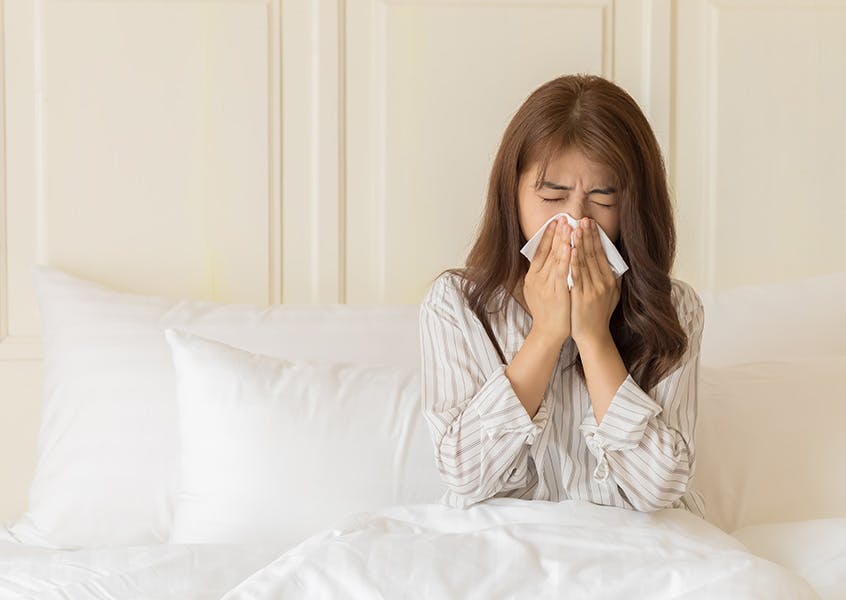In the past 10 years, it has been found that Thais, both children and adults, have increasingly suffered from allergies, up to 3 to 4 times more. Children suffer from allergies at a rate as high as 38%, or approximately 4.3 million people, and adults suffer from allergies at a rate of 20%, or around 11 million people. This has increased significantly from statistics five years ago. The root causes of allergies are diverse, including air pollution, pollen, food, and many other allergens. Today, we will learn about allergies, how to cope with them, and suitable prevention methods.
What Causes Allergies?
Allergies are the body's reaction to foreign substances. The body produces a type of protein called Immunoglobulin E (IgE) to combat allergens and release histamine, which leads to tissue inflammation. The severity of symptoms varies from person to person, ranging from mild symptoms to severe, life-threatening conditions.
Common Allergies
Allergic reactions can vary from person to person, but common allergens include:
· Medications like certain allergy medicines, such as Hydroxyzine and Cetirizine, as well as insulin.
· Foods like eggs, cow's milk, peanuts, seafood, etc.
· Insects like bees, fire ants, and mosquitoes.
· Latex, rubber, etc.
· Fungi, yeast, etc.
· Pollens from flowers and plants.
· Animal-related allergens such as animal fur and saliva.
· Dust particles, including PM2.5 in the air and dust mites in beds and sofas.
What Are the Symptoms of Allergies?
Allergy symptoms can vary from person to person. Some may experience minor reactions like sneezing and a runny nose, while others might have severe reactions, including anaphylactic shock that can be life-threatening. Allergies affect different systems in the body:
· Respiratory system: Symptoms may include sneezing, runny nose, nasal congestion, coughing, wheezing, and shortness of breath.
· Skin: Allergic reactions may cause hives, itching, swelling, redness, or eczema.
· Gastrointestinal system: Symptoms may include stomach cramps, diarrhea, vomiting, and in severe cases, anaphylaxis.
· Other symptoms: Some people might experience headaches, dizziness, low blood pressure, and even life-threatening conditions like anaphylactic shock.
How Can We Determine the Cause of Allergies?
1. Allergen Skin Prick Test: This test involves pricking the skin with a needle containing allergens to see which substances trigger an allergic response. It can be performed on individuals aged one year and older.
2. Serum Specific IgE Test: This blood test identifies the specific allergens an individual is allergic to without direct exposure to allergens. It is safe and suitable for patients of all ages.
Can Allergies Be Cured? How Should We Deal with Them?
Currently, there is no cure for allergies, but they can be managed and prevented with the following strategies:
· Avoid allergens: Stay away from substances that trigger your allergies and use allergy medications as prescribed.
· Regular exercise and adequate sleep: A healthy lifestyle contributes to a stronger immune system.
· Balanced diet: Consume a balanced diet with five food groups and foods rich in vitamin C, like oranges and guavas, to boost your immunity.
Allergies are prevalent and can affect both children and adults. Proper self-care and maintaining good health can help you prevent various diseases, including allergies. If you are interested in health care, you can find more information at https://www.krungthai-axa.co.th/th/health-advisories.
References:
· Cleverland Clinic
http://bitly.ws/S95w
· NSH
http://bitly.ws/S95P
· โรงพยาบาลพญาไท
http://bitly.ws/S968
· โรงพยาบาลเปาโล
http://bitly.ws/S96I
· Mayo Clinic
http://bitly.ws/S96M
· Siriraj Hospital
· Bangkok Hospital
https://bit.ly/3PJZKoP


